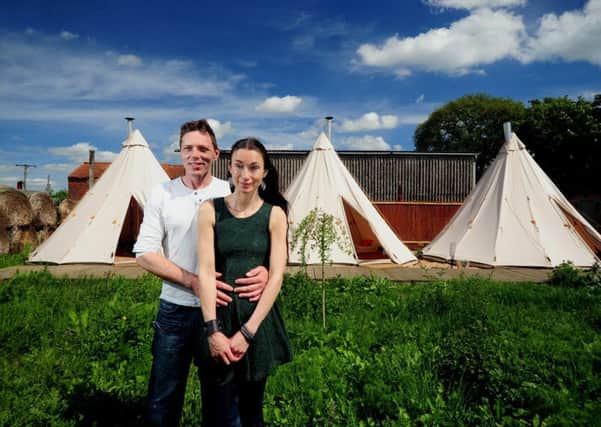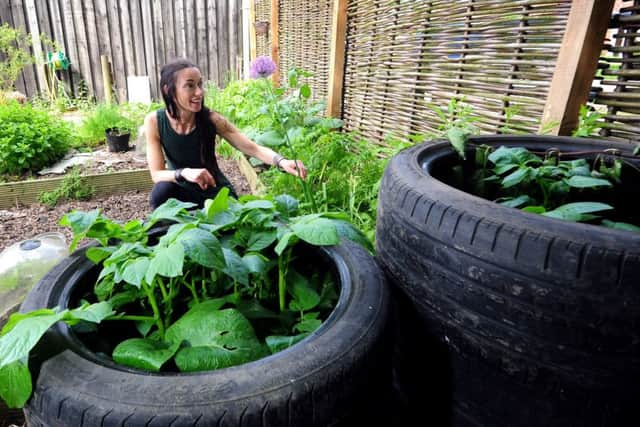Meet the woman training others to survive an apocalypse


One East Yorkshire woman took the concept to the extreme. Di Hammill had such an overwhelming desire to carve out a more simple existence that she spent several years living completely off-grid in a remote dale in the North York Moors. What’s all the more remarkable is that she was a single mum of three at the time.
For the first few years of their lives, Di’s children had no access to television or any other form of technology. The family’s days were spent collecting firewood and foraging for wild food. Di used fur from rabbits killed on the roads to line her children’s boots for winter and the family bathed in a nearby river.
Advertisement
Hide AdAdvertisement
Hide AdBehind this alternative lifestyle lay Di’s desire to ‘allow her children to develop in their own way’, with no outside influences. However, she’s the first to admit that it was by no means easy, adding: “It was very lonely and isolated, but I wanted to get back to nature as much as I could and take the kids away from popular culture.”


Fast forward 10 years and the family are now living a much more conventional existence, in a former farmhouse near the village of East Cottingwith. These days, Di’s children, now teenagers, have access to the shop-bought products that she once shunned, as well as iPads and other typical trappings of modern, teenage life.
Di said: “I’m not such a purist now the children are older; my kids are normal teenagers. It wouldn’t have been fair for me to impose that lifestyle on them as they got older.”
Although life has changed dramatically for the family, Di is confident that the experiences of those early years have remained with her children and equipped them with a sense of self-reliance.
Advertisement
Hide AdAdvertisement
Hide AdShe said: “When I had my kids, I started to notice how everything is farmed out; we’ve become de-skilled as women. Once we’d have cooked everything from scratch and known what plants to treat our kids with when they were ill. I wanted my kids to have these skills, and be quite tough and self-disciplined. They do say that the values asserted in our childhood come back to us; they certainly did with me. I think it’s true, as my daughter can make pretty much anything.


“Self-reliance is about being able to rely on your own skills and resources, rather than those of others. This could be in the realms of housing, health care, mental health, parenting, fitness and skill development. ‘Others’ could be your parents, a partner, your children, shops, doctors or teachers – anyone or anything you seek recourse to for the fulfilment of basic needs.”
Di quotes the words of the Jacobean playwright John Fletcher, who wrote ‘Man is his own star’. It’s a phrase that was also quoted by the American poet and lecturer Ralph Emmerson in an essay entitled Self-Reliance, which was written in 1841.
She explains: “Life should be a struggle occasionally, you should be OK being more productive and efficient than relaxed and lazy.”
Advertisement
Hide AdAdvertisement
Hide AdLike their mother, Di’s children can turn their hands to almost anything; the family grow most of their own vegetables and Di has her own apothecary stocked with remedies made from wild plants.
The decision to live off-grid with three young children was undoubtedly a brave one, but Di’s own childhood equipped her with a fierce independence and steely determination.
Following a custody dispute, she was raised by her father and grandfather, adding: “I was given to my Dad, which was rare in the 1970s. He was a single dad and a hippy. He and my grandfather raised me, but I pretty much brought myself up really.
“They both expected me to become self-reliant from a young age; they’d kind of forget about me at times, each thinking the other was looking out for me. They even taught me how to break into the house when they’d accidentally locked me out!
Advertisement
Hide AdAdvertisement
Hide Ad“I wouldn’t change anything though; I’ve seen friends who had it all – two loving parents – and they’re weak as anything! We are actually optimised to survive yet it’s all too easy to learn to say ‘no’ or ‘I can’t’ if someone else is there to pick up the pieces.”
In fact Di credits her father with equipping her with many of the skills that helped her survive those gruelling years living alone with her children in one of the most isolated areas of the county.
Having tested her own self-reliance skills to the maximum, it seemed a logical step to share what she’d learnt with others. It was only matter of time before Di began running wild food walks to demonstrate how to forage for ingredients and offering a range of workshops, which include How to Survive an Apocalypse - aimed at helping people to become more self-reliant.
She said: “I was already working as a teacher and some of my skills, such as willow weaving, are self-taught, but I wanted to reskill myself so I went on loads of courses, usually with the kids in tow.”
Advertisement
Hide AdAdvertisement
Hide AdDi’s new venture took off and, these days, Boundary Farm, which she rents with her partner, Lee, is the headquarters for The Wild Harvest School of Self-Reliance. Lee now works alongside Di and they’ve brought together a team of self-reliance experts who can be called upon to run different courses. Between them, they can cover everything from beekeeping and wild medicine to an introduction to permaculture.
The former farm’s old foldyard and brick outbuildings are a suitably quaint and attractive setting for day courses. In an adjoining field, white tipis, together with a rustic, outdoor kitchen and shower facilities, provide accommodation for guests taking part in weekend retreats. On summer evenings, it’s not unusual to find hen parties looking for an alternative to a boozy night out chatting around the campfire after a day spent making bath bombs, rag rugs and candles.
The family’s Silkie hens and pet dogs roam freely among borders stocked with herbs and medicinal plants, creating a relaxing and creative environment for guests keen to get away from it all.
As word of Di’s experience has grown, she has become an in-demand speaker at events nationwide and also hosts workshops as part of the annual Country Living Fairs in Harrogate and London.
Advertisement
Hide AdAdvertisement
Hide AdWhilst attending a day course or retreat may not be quite as life-changing or ambitious as Di’s own self-imposed dose of self-reliance, she’s keen to demonstrate that it’s a concept we can all adopt in different ways, even those of us who live in towns and cities.
She said: “Self-reliance is an urban concept too, not just rural way of life. I regularly lead wild food walks in the centre of York.”
For more information about courses and retreats at the Wild Harvest School of Self-Reliance, visit wildharvest.org.